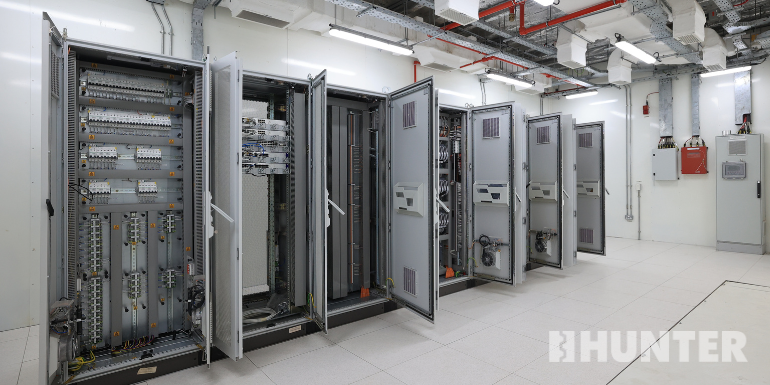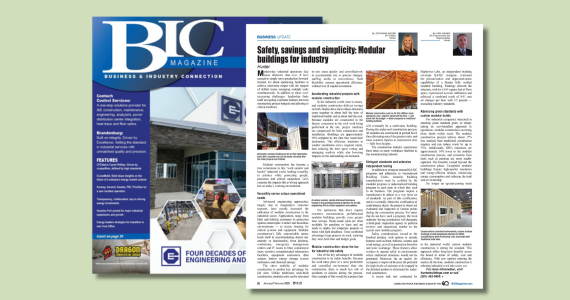Efficient, reliable electrical systems are non-negotiable on modern-day industrial sites. Whether tasked with maintaining safety protocols, ensuring efficient production ramp-ups or powering heavy machinery, if the electrical system isn’t adequately protected, operations and safety are at risk. That’s where the modular substation comes in.
Built to house and protect critical electrical infrastructure while keeping costly disruptions at bay, the modular substation has revolutionized industrial operations’ approach to power. Here, Hunter’s modular construction experts offer insights into the role these structures play on the jobsite, the benefits a modular construction approach offers and customizations that offer next-level support.

What Are E-Houses or Substations?
Substations, also known as E-Houses or electrical houses, are compact, self-contained structures that support an operation’s electrical infrastructure. These buildings provide housing for the components needed to distribute or control power, including transformers, monitoring systems, distribution panels, switchgear and more. There are a number of reasons industrial operations opt for specialized E-Houses and substations over everyday steel buildings.
- Centralized Power Distribution: E-Houses and substations serve as consolidated hubs for power distribution within industrial facilities. Bringing the requisite components together into one location makes it easier to streamline distribution while minimizing energy loss, ensuring a steady power supply to critical systems and equipment.
- Improved Reliability: Reliability is imperative in industrial settings where downtime can result in production loss and diminished revenue. The system redundancies and protections incorporated into substations or E-Houses minimize the risk of electrical failures. That enhanced reliability translates to improved operational continuity, reduced downtime and an overall boost in productivity.
- Safety Enhancements: E-Houses and substations feature safety considerations such as grounding systems, high-quality insulation and protective enclosures to mitigate the risk of electrical hazards. In addition, their centralized placement fosters easier monitoring and maintenance of essential electrical equipment, thus promoting a safer environment for personnel and those nearby.
- Regulatory Considerations: Adherence to industry regulations and regional safety standards help operations avoid potential legal liabilities while also creating safe, efficient work environments. Substations and E-Houses are engineered to meet or exceed requirements set forth by regulatory agencies, and to provide peace of mind to those who own or utilize such structures.
Why Choose Modular Construction for Your Substation or Electrical House?
Modular construction in general offers countless benefits such as quick, budget-conscious builds and lower-waste impacts that are better for the environment. As it relates to substation or E-House projects, however, there are a number of ways modular construction offers industrial operations the advantage.
- Rapid Deployment & Installation: Traditional construction methods require extended timelines due to issues such as weather delays, travel time and site preparation holdups. Because modular construction takes place in off-site manufacturing facilities, the building process can coincide with site prep — and carry on amid even adverse weather.
- Flexible Scalability: As with any modular building, a modular electrical house is designed to suit current needs, while remaining flexible enough to adapt to future growth. When ramp-ups require system upgrades, or when reconfigurations become necessary due to equipment purchases, modules can be expanded and tailored quickly, with minimal downtime.
In addition, relocation is simple once a module is no longer needed on a particular site. Whether it can be put to use elsewhere on the existing site or in another geographic location altogether, a modular electrical house can serve operations well — and in a number of ways — for decades. - Enhanced Quality Control: It’s already been stated that modular electrical houses come together in off-site manufacturing facilities with access to virtually every tool and material necessary. Not only do factory-controlled processes help ensure consistency across every component of the electrical house, but on-site testing and evaluation resources make it easy to spot potential problems that might otherwise go overlooked and ensure a higher-performance finished product that keeps operations unimpeded.
How Can You Customize a Modular E-House to Suit Operational Needs?
At Hunter, our team likes to say that if you can dream it, we can do it. The beauty of utilizing modular construction for an E-House is that the options are virtually unlimited. Here, we’ll discuss just a few custom elements regularly incorporated into modular E-House projects.
- Environmental Considerations: Industrial projects often take crews to remote environments where extreme weather comes into play. Considerations such as HVAC systems, weatherproofing and top-tier insulation create comfortable environments for team members who must install or adjust electrical components. At the same time, they provide needed protection for the systems upon which operations rely.
- Enhanced Safeguards: When a company’s work takes place in conflict zones, areas at risk of ballistic attacks or those prone to natural disasters, elevated protection is crucial to keep an E-House carrying out its work efficiently and effectively. Incorporating blast-resistant technology and custom fire ratings can keep crews and equipment better protected. Meanwhile, requesting structures built to specific API RP standards can allow operations to locate an E-House in more areas throughout a site.
- Creature Comforts: Although an E-House’s first line of duty is to safely house critical systems, these structures can serve human workers, too. Comfortable workstations, seating areas and even washrooms can make working conditions more manageable for employees, thereby fostering more efficient operations.
- Custom Aesthetics & Configurations: No two jobsites are exactly alike, even when they carry out more or less the same work. Modular construction makes it easy to tailor an E-House or substation’s layout to suit unique systems, equipment or operational needs. The structures’ customizable nature also allows for the incorporation of architectural elements, accessibility considerations and custom color palettes to ensure the finished product meets brand standards, blends with surroundings and serves every member of the team well.
The modular substation offers a compelling solution for industrial operations looking to better protect their electrical infrastructure while also enhancing efficiency, flexibility and reliability. By leveraging the benefits modular construction brings to the table, it’s possible to create a structure that streamlines operations, minimizes downtime and helps you remain competitive.
If you have questions about any of the above, or if you’re interested in incorporating custom modular substations into your operations, feel free to reach out to Hunter. Our pros look forward to working with you.


